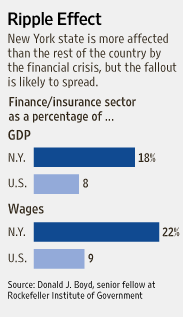Back in July, I raised the idea that the financial market meltdown will eventually bring with it a particularly ugly scenario for the state of New York. (See: The Big Apple is Rotten) Over the past few months, Governor David Paterson has been voicing his concern over potential budget shortfalls and ways in which they may be funded.
Now the unwelcome reality is starting to appear as New York’s annual budget is expected to show a $2 billion deficit for this year and upwards of $12.5 billion next year. The Wall Street Journal had some interesting reading:
New York state also faces a $12.5 billion deficit in 2009, and the Democratic governor has said he would ask labor unions to forgo 3% raises called for by contracts that would have to be renegotiated. But Gov. Paterson has rejected calls for higher taxes on the wealthy — unlike New York City Mayor Michael Bloomberg, who has proposed tax increases.
“[T]he higher we tax even the wealthy, the more we lose population and the less job creation there is,” Gov. Paterson said in an interview Friday. “We’re pretty resigned to the fact that we’re going to have to do this with spending cuts.”
A conundrum as taxing the wealthy will potentially cause them to leave the state and not taxing them is of no benefit to the budget. Talk about a no-win situation.
New York’s governor blames the state’s current shortfall, in part, on its failure to better manage revenue during the years of soaring Wall Street profits. “What’s actually more embarrassing than the fact that we have such a huge deficit now, when bonuses are down and capital gains are down, is the fact that when there was…wealth, we overspent,” says Gov. Paterson.
In 2001, New York state was able to close a budget gap with a temporary income-tax increase, but some say that may not work this time because Wall Street is undergoing a structural realignment, not a cyclical downturn. If the financial industry re-emerges as one that is more tightly regulated and more risk-averse, that could mean fewer years of record profits.
“It suggests that the city and the state will have to tighten their belts permanently,” says Kathryn Wylde, president of the Partnership for New York City, a group of chief executives. “The financial-services industry will never be the bonanza [for the city] that it once was.”
One silver lining: Lower office rents and real-estate values could draw new businesses. Already, city officials have worked to cultivate the biotechnology, hospitality and tourism sectors.

Wall Street Journal Graphic
















